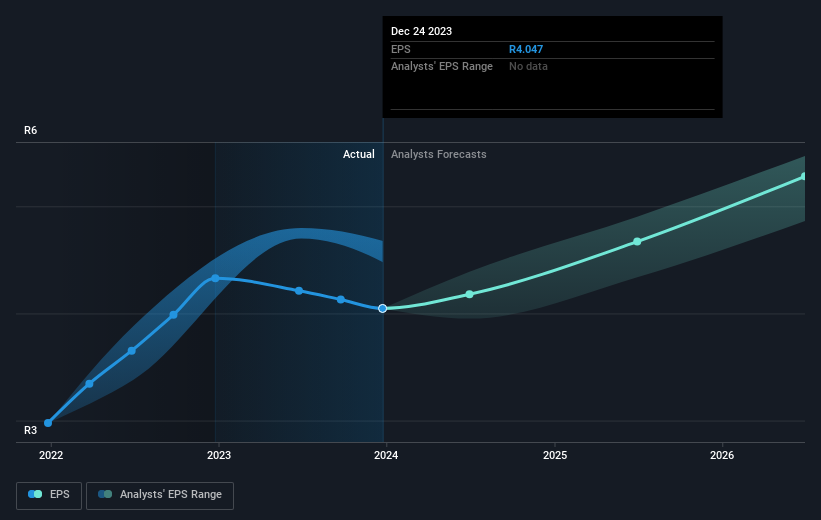Investing in Woolworths Holdings (JSE:WHL) five years ago would have delivered you a 60% gain
Woolworths Holdings Limited (JSE:WHL) shareholders might be concerned after seeing the share price drop 10% in the last quarter. But the silver lining is the stock is up over five years. In that time, it is up 36%, which isn't bad, but is below the market return of 40%.
Let's take a look at the underlying fundamentals over the longer term, and see if they've been consistent with shareholders returns.
Check out our latest analysis for Woolworths Holdings
To quote Buffett, 'Ships will sail around the world but the Flat Earth Society will flourish. There will continue to be wide discrepancies between price and value in the marketplace...' One flawed but reasonable way to assess how sentiment around a company has changed is to compare the earnings per share (EPS) with the share price.
During five years of share price growth, Woolworths Holdings achieved compound earnings per share (EPS) growth of 3.9% per year. This EPS growth is lower than the 6% average annual increase in the share price. This suggests that market participants hold the company in higher regard, these days. That's not necessarily surprising considering the five-year track record of earnings growth.
The image below shows how EPS has tracked over time (if you click on the image you can see greater detail).

We know that Woolworths Holdings has improved its bottom line over the last three years, but what does the future have in store? Take a more thorough look at Woolworths Holdings' financial health with this free report on its balance sheet.
What About Dividends?
As well as measuring the share price return, investors should also consider the total shareholder return (TSR). The TSR is a return calculation that accounts for the value of cash dividends (assuming that any dividend received was reinvested) and the calculated value of any discounted capital raisings and spin-offs. So for companies that pay a generous dividend, the TSR is often a lot higher than the share price return. As it happens, Woolworths Holdings' TSR for the last 5 years was 60%, which exceeds the share price return mentioned earlier. And there's no prize for guessing that the dividend payments largely explain the divergence!
A Different Perspective
Woolworths Holdings shareholders gained a total return of 3.6% during the year. Unfortunately this falls short of the market return. On the bright side, the longer term returns (running at about 10% a year, over half a decade) look better. It's quite possible the business continues to execute with prowess, even as the share price gains are slowing. It's always interesting to track share price performance over the longer term. But to understand Woolworths Holdings better, we need to consider many other factors. Even so, be aware that Woolworths Holdings is showing 2 warning signs in our investment analysis , you should know about...
If you like to buy stocks alongside management, then you might just love this free list of companies. (Hint: many of them are unnoticed AND have attractive valuation).
Please note, the market returns quoted in this article reflect the market weighted average returns of stocks that currently trade on South African exchanges.
Valuation is complex, but we're here to simplify it.
Discover if Woolworths Holdings might be undervalued or overvalued with our detailed analysis, featuring fair value estimates, potential risks, dividends, insider trades, and its financial condition.
Access Free AnalysisHave feedback on this article? Concerned about the content? Get in touch with us directly. Alternatively, email editorial-team (at) simplywallst.com.
This article by Simply Wall St is general in nature. We provide commentary based on historical data and analyst forecasts only using an unbiased methodology and our articles are not intended to be financial advice. It does not constitute a recommendation to buy or sell any stock, and does not take account of your objectives, or your financial situation. We aim to bring you long-term focused analysis driven by fundamental data. Note that our analysis may not factor in the latest price-sensitive company announcements or qualitative material. Simply Wall St has no position in any stocks mentioned.
About JSE:WHL
Woolworths Holdings
Through its subsidiaries, operates a chain of retail stores in South Africa, Australia, and New Zealand.
Reasonable growth potential with adequate balance sheet.
Similar Companies
Market Insights
Community Narratives





